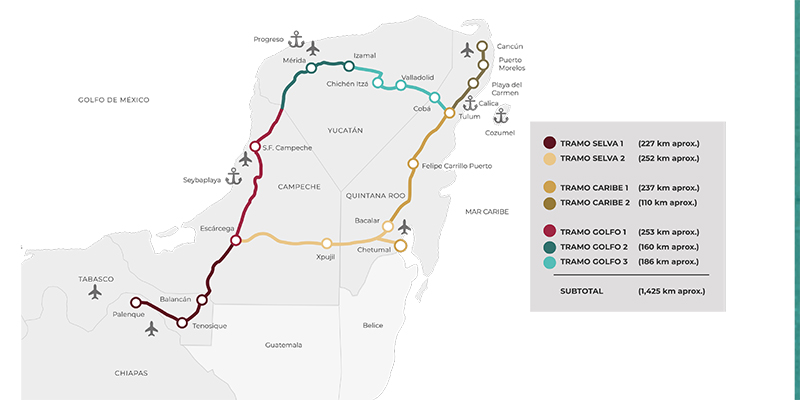
What is the Mayan Train and who is Fonatur Tren Maya?
The Mayan Train is a tourism-oriented train and railroad network, spanning approximately 1,425 km, to transport cargo and passengers throughout the Mexican states of Quintana Roo, Campeche, Chiapas, Tabasco and Yucatán. The Mayan Train has been identified as one of the most important regional projects in Mexico due to its potential to facilitate tourism, create hundreds of thousands of jobs, promote sustainable development and develop programs to protect the environment. The project has received the support of the self-proclaimed leftist Mexican president, Andrés Manuel López Obrador.
The sponsor of the project, Fonatur Tren Maya, is a majority government-owned corporate entity of the Mexican National Fund for Tourism Development (FONATUR). FONATUR is the strategic instrument for the development of tourism investment in Mexico. It has played a central role in the development of, among other initiatives, five of Mexico’s top beach resort areas: Cancun, Ixtapa, Los Cabos, Loreto and the Bays of Huatulco.
The BOOT structure
Over the last few decades, the Mexican economy has undergone several reforms to open industries that were once controlled exclusively by the Mexican government to the private sector. The railroad industry was one of those industries , which in turn has allowed the Mayan Train to benefit from the incorporation of private investment.
Specifically, the Mayan Train is an example of a BOOT structure. Pursuant to the award, Fonatur Tren Maya is granted the exclusive right to operate the project for 30 years. However, the project reverts back to the state 50 years after the date of the award’s issuance. Such schemes have allowed for private investment to flow through the Mexican economy via corporate entities such as Fonatur Tren Maya, all while providing the state with the long-term control and benefits of the related project.
Opportunities for investment
The development of the Mayan Train is divided into various phases. Currently, the project is undergoing Phase 1, in which FONATUR is focusing on securing the financing and construction for five different routes of the railroad through international public bidding. Phase 1 of the project covers a total of 951 km of railroad routes, and the remaining phases of the project will be used to cover the remaining 474 km of railroad routes.
On April 23, 2020, FONATUR awarded its very first contract for the Mayan Train. The 15.5 billion peso ($626 million) contract entails the construction of the first Mayan Train route, which spans approximately 227 kilometers between Palenque, Chiapas and Escárcega, Campeche. This route alone is expected to create 80,000 jobs in the region. The contract was awarded to a consortium of investment and construction firms, including Mota-Engil Mexico, China Communications Construction Company, Grupo Cosh and Eyasa y Gavil Ingeniería.
